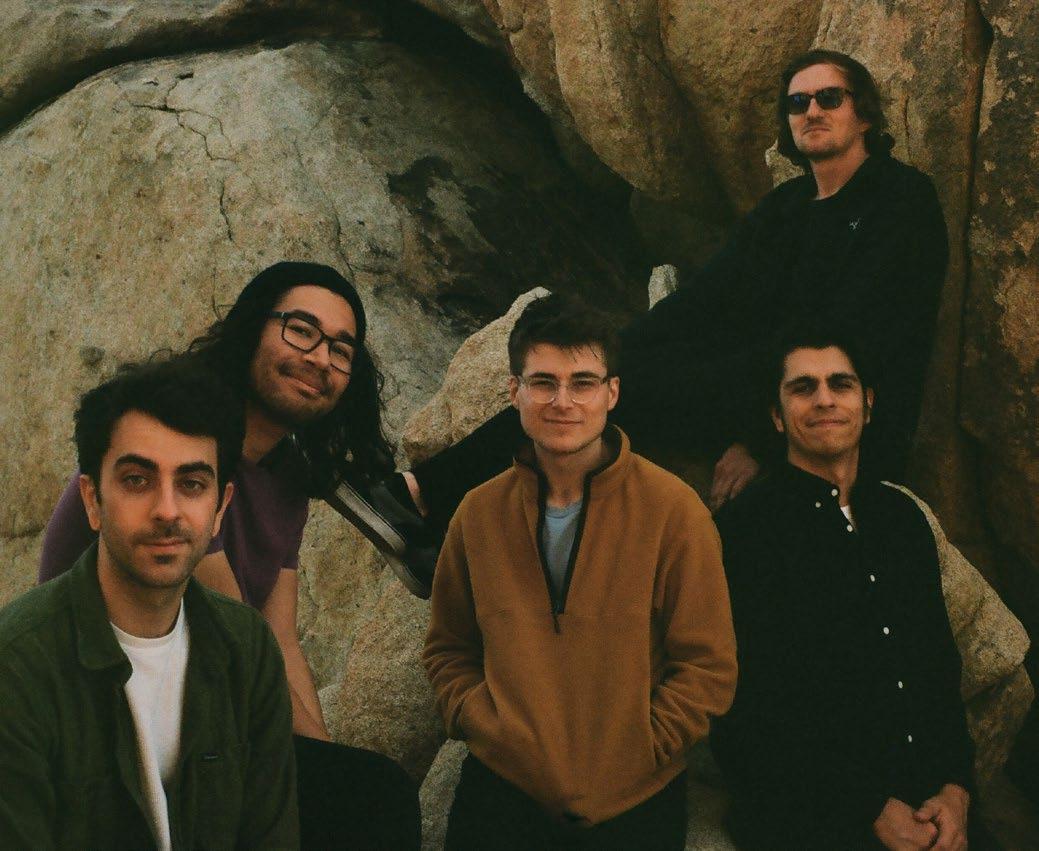
9 minute read
ADULT
FROM THE DARKNESS AND INTO THE LIGHT ADULT INTERVIEW WITH SINGER / SONGWRITER / PRODUCER NICOLA KUPERUS BY J POET
Perception is/as/of Deception contains tations,” Kuperus continues. “Everything is some of the most personal songs that on hold, with a constant fear of how we will the Detroit duo known as ADULT. - Nicola deal with a family member or friend getting
Advertisement
Kuperus, keyboard player, singer, songwriter, sick. One moment we are confident and producer and Adam Lee Miller, keyboard feel secure. The next, we’re having a total player songwriter, producer - has ever created. existential crisis.” The album was recorded in their basement At a time when much of the country is
I’m Glad It’s You haven’t had an easy time over the last couple of years. In July 2017, rather than celebrating how much their Oso and Joyce Manor, on tracks such as “Death Is Close.” In fact, there’s an overarching Britpop theme that adds a unique fizz to debut album, The Things I Never Say, was resonating with fans on the road, an accident shook the band up forever. While the band members walked away with minor injuries, their videographer and mentor Chris Avis didn’t. And what makes Every Sun, Every Moon - the band’s sophomore effort, once more on 6131 Records - even more impactful, is that guitarist and vocalist Kelley Bader was the one behind the wheel. The result, a eulogy of sorts, is a haunting novel of blame, optimism, and self-discovery, which teaches us to let go and let fate run its course. “The entire album revolves around the loss of Chris Avis and the subsequent period of grieving,” says Bader. “At the risk of sounding hyperbolic, writing it was one of the most difficult things I’ve done. I ignored a lot of the heavy lifting of the healing process until
I began writing the album, which effectively reintroduced me to the experience all over again, only with a lot of amended expectations and a deadline.”
But make no mistake, the band doesn’t drape their songs in a morose bed. Sure, you can find something for fans of Balance and Composure in the grittier sections, but there are also catchy, anthemic jams for fans of Jimmy Eat World, Say Anything, Oso studio, over an intense five-month period. They “We were working with the theme of perpainted the walls black, retreating from the ception and what it means to us. What did world, to focus on the music. it mean to writers such as Aldous Huxley, philosophers such as Merleau-Ponty, critics “The world is at a tipping point,” Kuperus of art and literature like Goethe, and artists says. “We’re surrounded by cultural dead like Cocteau? What did perception mean ends and political ignorance. We’re on the to them, and what does it mean in the conprecipice of a cultural pandemic.” text of deception? How much wool is getting pulled over our eyes?” confined to their homes, retreating into The music on Perception/Deception coma basement studio to make music almost bines propulsive dance beats, heavily seems presentient. processed vocals and slabs of avant-garde noise, that magnify lyrics exploring the ways the record, despite the dark lyrical content. It’s interesting how tragedy often encourages creative risk, and Bader believes this part of the creative process ties into what we harbor deep beneath the surface. “I thought the contradiction of the musical tone paired with lyrics about mortality and trauma would describe what it feels like trying to hide your trauma in order to stay composed and function in the world,” he says. “It’s sort of like wearing a mask every day.” This is why, ultimately, Bader has crafted a concept album tied heavily to mortality and how we cover up when we face it head on. It’s as personal and narrow as he’s ever been in terms of narrative as well. As for the album’s title, it’s simply part of trying to understand his role in the grand scheme of life. “The title is attempting to convey a sense of eternity, of always remembering and carrying that memory further,” Bader explains. “It’s also a way of accepting the duality of existing, of living in a universe filled with darkness and light, joy and grief, and loss and life.” And from the lyrics, you can tell death is a ghost that won’t ever go away, but it’s something Bader is coping with better, especially “The virus intensifies the daily struggle and technology shapes modern life, and not forces us to constantly readjust our expecalways for the good. Growling synthesizers and chiming gongs give an ominous feel to “Don’t Reduce Me,” as Kuperus investigates the way advertising distills things down to their most simplistic forms. The thumping bass of “Have I Started at the End” gives the track an upbeat feel. This contrasts with lyrics that questions the self-imposed blindness of everyday perception.
The idea of a divide between perception and reality is an interesting one, especially as he knows how many lives his friend touched. Of course, the songwriter admits it hits a bit harder these days, but he has learned to lean towards the light. It’s why he can’t wait to sing, scream, and pay homage to his brother when it’s safe again. “I think about him and his work a lot during these COVID-19 days,” Bader says. “Without people when our President seems unable to separate the two. One of the album’s songs, “Total Total Damage,” could be his theme song.
“Yes, undoubtedly,” Kuperus says. “It’s almost so ‘right on’ that I felt like we should have left it off the record. It’s too true and terrifying. I mean, I like to stir it up, make people wake up, pay attention, think about the choices they are making, but this is just too…
I’M GLAD IT’S YOU INTERVIEW WITH GUITARIST / SINGER KELLEY BADER BY RENALDO MATADEEN
I don’t know. It is total, total damage.” ��

PHOTO BY MCKENZIE MELCHER
like him documenting live shows, we’d all be less connected to each other and even ourselves. I think it will be a relief to play these songs live. I’ve heard the phrase ‘Chris would’ve wanted you to keep on’ for so long now, and it’s difficult when that’s inhibited. We’ve wanted to share this story for a long time, and being together with people, playing loudly and freely feels like the right way to share it.”��
LESSONS FROM THE MASTERS DITCHES INTERVIEW WITH SINGER/GUITARIST JOHAN LONEGRAN BY JOHN B. MOORE
Buried among the long list of influences in the music of Stockholm-based four-piece Ditches is the ferocity and melody of The Marked Men. So, it seems only natural that the band would have The Marked Men co-founder Jeff Burke involved in their debut, self-titled LP. Along with producing, Burke also added some backing vocals on the album, which is out now on Drunken Sailor Records. “Well, there’s no question about it that we all really like what The Marked Men put out over the years,” says Lonegran. “So, when we recorded the 1000 Elephants EP, we reached out to Jeff Burke and Mark Ryan who, at the time, ran Cool Devices Studio, and asked them if they’d be interested in mixing and mastering the EP, which they did. Since we’ve always been happy with the result, it seemed like the next natural thing for us to do. I think we started talking about it when we opened up for Radioactivity in Stockholm back in 2018, but it took a bit more than a year to make it happen.” The band met up with Burke in New York for a couple of weeks last summer to work on the record. They spent three to four days in a Brooklyn studio before
Woodstock, in New York state, is noted for the legendary rock festival that bears its name, but it’s also the home of The Bobby Lees, a band that’s developed a unique fusion of blues and in-your-face rock. Most of the band – drummer Macky Bowman, lead relocating to Burke’s apartment to work on backing vocals. “Overall, everything went pretty smooth, and I think we have some precious memories and gained guitarist Nick Casa, and bass player Kendall Wood – graduated from high school last year. Bandleader Sam Quartin is a few years older. “I always wanted to have a band, but I was too scared to sing or play in front of anysome experience in the making,” Lonegran says. “Jeff is not only a really good musician, he’s also a great guy, and super fun to hang out with. I’d sure love to do it again.”
Ditches combine equal measures of garage, power pop, and punk rock to come up with their sound, and despite having some obvious influences, their personal music collections are pretty disparate. “We all share the similar core influences, coming from the Swedish punk scene in

THE BOBBY LEES
INTERVIEW WITH SINGER / SONGWRITER / GUITARIST SAM QUARTIN BY J POET
one way or another. But I think we all also

one,” Quartin says. “I couldn’t sing without crying. I thought I sucked too much to share what I’d written, so I left New York and moved up to Woodstock. Somebody told me to read The Artist’s Way by Julia Cameron. It suggested trying things and not judging yourself, so I started playing have pretty broad musical influences of our own, which, of course, finds its way into our song writing,” Lonegran says. “Everything from hardcore punk to indie pop, or 60’s doo-wop.”
For now, the band is not expecting to tour the U.S., but it’s always a possibility. “No plans at the moment, but we all would of course love to go on a U.S. tour,” Lonegran says. “It’s been in the back of our heads since we started the band. If there are any tour managers in the U.S. reading this, get in touch!” �� �� ��
PHOTO BY ELA STRAND
around town and met Kendall, Macky, and Nick. A couple of months later, we recorded our first album, Beauty Pageant.”
Beauty Pageant is a bracing blast of punk infused blues, but it does nothing to prepare you for the intensity of Skin Suit, the band’s second outing. With the help of Jon Spencer from The Blues Explosion, they’ve crafted a blistering blues/rock hybrid of epic proportions. Quartin’s unruly vocals are supported by the band’s wall of noise and Spencer’s sonic explorations. It’s hard to believe music this loud and intense was made by a quartet.
“We recorded everything live,” she says. “The drums were isolated, but we could still see Macky. Nick, me, and Kendall were in one big room together. On a few songs, I recorded the vocals in a booth, and some songs we just used the live scratch track. Jon got us to do stuff we wouldn’t have thought to do. I get intimidated when there’s too many choices, so it was amazing to have someone who knows what the fuck they’re doing when it comes to the technical shit. Vocally, he’d have me try stuff I don’t normally do.”
Quartin’s vocals have an impressive, somewhat disturbing sound, a visceral yelp of raw pain and anger. On many tracks, it seems as if she’s descending into chaos. “We tested the songs at shows to get a better feel for them, but vocally I try to not have anything planned,” she says. “I change things up every time I sing. I like music that sounds like it’s a matter of life or death when it’s playing. Like the person singing has no choice but to get it out.” �� NEW NOISE










